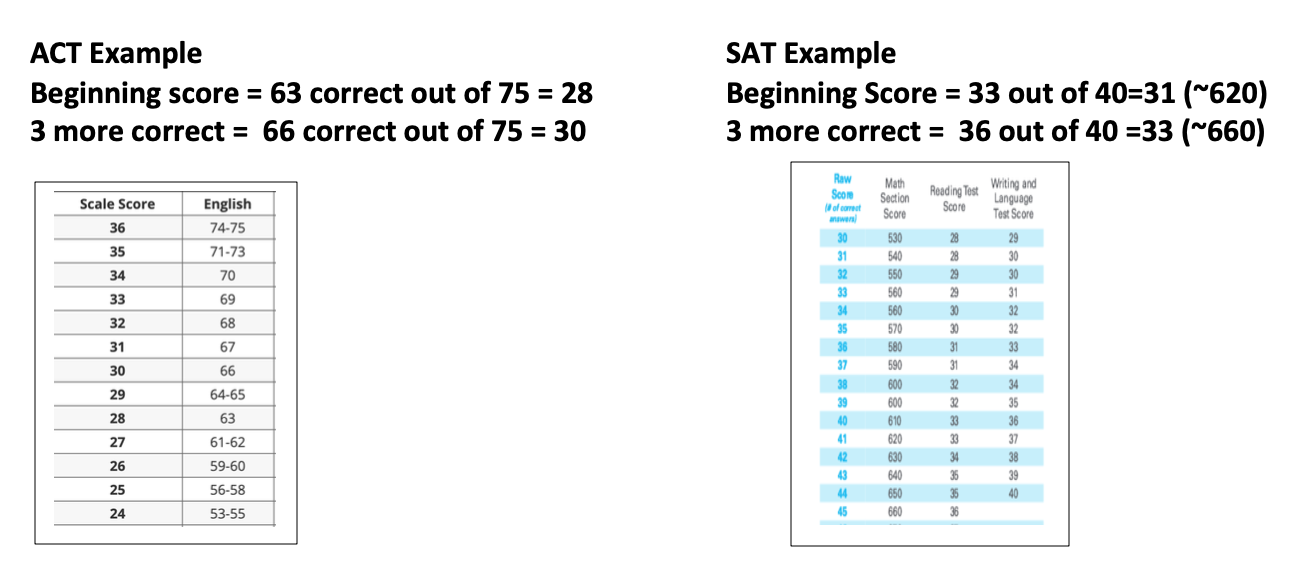Raise Your ACT/SAT Verbal Score in 3 Weeks
I’m going to show you how you can improve your ACT English or SAT Writing score in just a few weeks’ time with 6 straightforward steps, 1 book — and no tutor.
But first, a little background.
No One Cares About Grammar Anymore, Right?
It’s striking how often I hear this from parents and students — even from kids who take Honors- and AP-level English classes. While the lack of feedback on writing mechanics or focused grammar instruction may make it seem like grammar doesn't matter, it definitely does. It's just that instead of getting graded on it directly, you're being judged on how grammar errors may affect the clarity or tone of your writing. However, on the ACT and SAT, you are, essentially, getting graded directly on your grammar and editing skills.
Shouldn’t We Be Learning This In School?
Great question! Yes, you should. Academic advising shows that students learn grammar best through the process of reading and writing, but many reach high school without mastering the basics. Here's why:
Reading for pleasure - one of the mechanisms for picking up grammar naturally - is on the decline among tweens/teens generally, and among boys especially.
According to Kate Walsh, President of the National Council on Teacher Quality, teachers receive “little training in how to teach writing and are often weak or unconfident writers themselves.”
Teachers often give feedback on students’ ideas and arguments, but seldom offer assistance with sentence mechanics.
We Need Grammar: It Helps Us Write What We Mean
To demonstrate my point, here’s a silly picture with a simple sentence.
This meme illustrates my point about a simple grammatical concept – one that’s frequently tested on both the ACT and SAT. Basic comma placement is not an advanced skill; all students need to write clear and coherent sentences. It's just one of the many ways in which a simple grammatical concept can influence how readers understand your point — or miss it entirely.
ACT/SAT Grammar: Low Hanging Fruit That Yields Big Results
It’s not often that prepping for a single test can perform “double duty.” By that I mean, not only can you improve results for the test itself, but you can acquire and improve important skills that you actually need for high school and college classes - and beyond - such as writing internship and job letters. The ACT English and SAT Writing sections are all about grammar and editing. This is the where the two tests are most similar and it's one of the easiest areas to improve. By putting in just a few weeks of focused effort, I’ve seen even the most grammar-challenged students make significant progress on this section. (That’s why you’ll often hear me refer to those sections as the “low hanging fruit.”)
By getting just three more questions right — on just a single section of the exam! —you can significantly raise your whole score.
Look at how raising your raw score by only one or two questions can boost your section score which, in turn, boosts your entire test score!
Here’s How: Focus On 3 Frequently-tested Concepts First
Even students who are so-so in English or who are non-native speakers can improve enough to boost their scores in a meaningful way with attention to these concepts. Let’s take a look at how that works:
By mastering a few of the most frequently tested items you can maximize your score!
Many students can accomplish this in less than three weeks, but I like students to take time with things to make sure they fully understand and retain what they’re learning.
Punctuation: Punctuation represents about 15-20% of total grammar/usage questions on both the ACT and SAT. You need to have the use of commas, semi-colons, colons, and dashes down pat! And that requires that you have a solid understanding of the difference between a sentence (independent clause) and fragment (dependent clause).
Verbs: Another 10% of the grammar/usage section, verb questions tend to focus on subject/verb agreement, conjugation (getting the tense right), and parallel construction (making sure a list of verbs ends up in the same form). One thing I’ve noticed is that sometimes students’ ease/difficulty with verb questions relates to the language they study and/or their native language. For students whose native language uses context for verb tenses, rather than conjugation (Chinese, Vietnamese, et. al.) sometimes have a more difficult time with these questions. See my post about language-specific ACT/SAT grammar challenges.
Transition Words: The solid understanding and use of transition words is a hallmark of good writing. In fact, if you Google the use of transition words, you’ll find that several college writing centers have published primers on how to when and how to use them. Here’s a good guide to the use of transition words from the Writing Center at UNC Chapel Hill. These questions ask you to connect two parts of a sentence with the correct word, so you have to understand how the ideas are related to decide if you’ll need to continue, contradict, show cause and effect, etc.
Because mastering only a few frequently tested concepts will significantly boost your score!
Here’s How: 6 Steps, 1 Book, No Tutor. Yes, it’s that simple.
Hopefully I've convinced you to sharpen up your grammar skills to boost your test scores. Getting a better handle on grammar will also make you a better writer across the board, so it's an endeavor that will continue to pay off.
Here's what you’ll need:
Get one of Erica Meltzer’s books: ACT English or SAT Grammar* (doesn’t matter which).
Complete the sections on punctuation, verbs, and transition words if you want to focus on just the 3 areas above. (But I recommend completing the entire book for an even bigger writing improvement and test score reward!) You must do it diligently and mindfully, including the exercises. No cramming!
Do a few official ACT or SAT practice grammar sections - untimed at first is okay. Just as with your sports or musical instrument practice, go for accuracy first, speed later.
Review your errors very critically. Careless mistakes or knowledge gaps? Assessing errors honestly is one of the most important steps for improvement.
Revisit workbook chapters for anything you didn’t quite understand or retain. If you still don’t understand the concepts, reach out for help.
Do more practice sections to hone skills, work on timing, and reduce careless errors.
And if you're not sure which test you'll take, that's okay. For the grammar section, studying for one will work for the other. They test the same concepts and skills; the tests just have slightly different question styles and visual layouts.



